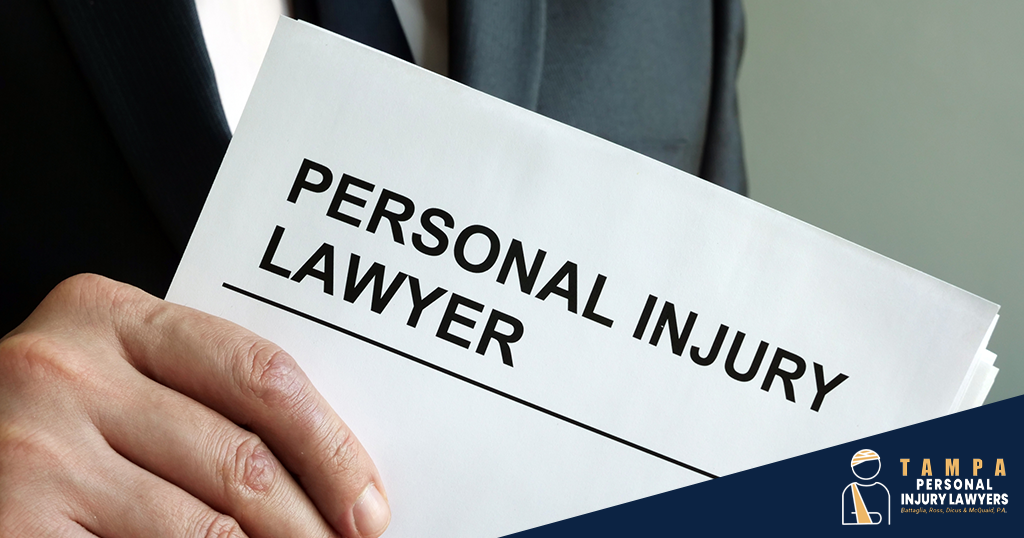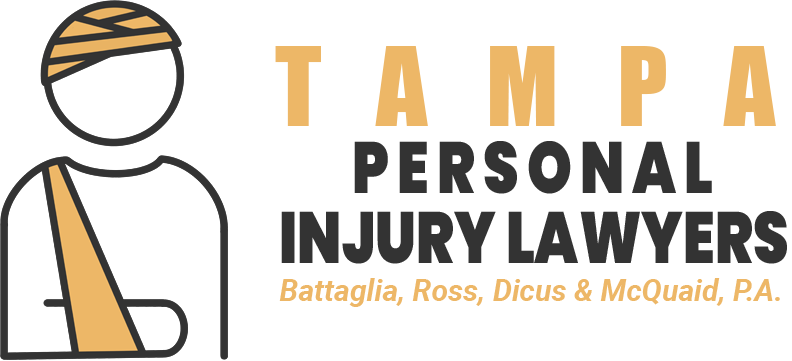Personal injury lawyers provide legal counsel to people who have been injured in an accident. Additionally, they help injured people recover compensation for damages caused by another person’s negligence. Car accidents are common sources of personal injury claims, but not the only type. Read on to find out about what a personal injury lawyer does and what type of cases they handle.
Table of Contents
TogglePersonal Injury Lawyers Help People Navigate Complex Legal Issues
Florida personal injury lawyers help protect peoples’ rights. It might sound simple, but it’s very common for people who don’t know their rights to get taken advantage of. Attorneys know how to anticipate tactics from the opposing party and foresee legal issues before they arise.
As legal professionals, they create an individually tailored, strategic approach for each case. This usually requires a continuous flow of tasks and working with other professionals.
A Personal Injury Lawyer Helps Injured Victims Get Fair Compensation
From slip and fall accidents to auto accidents and product liability claims, injury victims usually have enough on their plate while trying to recover. A personal injury lawyer can handle your case while you concentrate on your health and healing. Many people find this a huge relief and a facilitator to their recovery and peace of mind.
Here are some tasks you can expect a personal injury lawyer to handle on your behalf:
- Help you sort out medical bills
- Launch an in-depth investigation into the accident
- Act as your liaison with insurance companies
- Work with other experts to build a case that strongly supports your claim
You may be able to handle these tasks independently, but there’s a lot at stake. For example, making a mistake could delay your claims process or reduce your compensation amount.
This is why it’s best to have a legal professional moderate on your behalf. As a legal representative, personal injury lawyers ensure you aren’t bullied, shorted, or exploited by insurance companies.
A Personal Injury Lawyer Can Review Your Case and Give Sound Legal Advice
If you were injured due to someone else’s negligence, you could collect damage compensation for your losses. A personal injury lawyer is there to advise you on how to move forward strategically. For example, if the insurance company refuses to pay you a reasonable settlement, they can prepare your court case.
They will protect your legal interests at all costs. They will start by getting your account of the incident and gathering additional information necessary for clarification. After that, their job is to ask all relevant questions to get as much information as possible to paint a picture supporting your claim.
Let’s say you were injured in a motor vehicle collision. A personal injury lawyer knows what questions to ask and what details are relevant in this scenario. For example, they will look into the speed limit, traffic signs, and other details that show how the other party is at fault.
Or, if you were injured in a slip and fall accident, they might ask questions about how the fall happened. That could include details about the shoes you were wearing, the conditions of the environment in which the fall occurred, the lighting, any obstructions in the path, and more.
Once your attorney has all the facts and details of your case, they will provide customized legal advice on the next steps.
A Personal Injury Lawyer Conducts Thorough Investigations and Prepare Your Case for Trial
Discovery is a crucial part of preparing for a settlement and trial. That will involve a comprehensive investigation, perhaps with the help of accident reconstruction experts and witnesses. Additionally, an attorney might want to conduct on-site or in-person investigations or hire private investigators to look into the accident.
Private investigators often search for details the insurance company misses or deliberately excludes. Here are some things an independent investigator can find out for you:
- Witness information
- Acquiring additional photos, videos, and diagrams of the accident
- Gather other relevant documents
- Confirm any dangerous conditions (for premises liability cases)
Once your attorney gathers ample evidence, they may start preparing interrogations or written questions for the other party. Finally, they may also request a deposition to ask the other party questions under oath.
A Personal Injury Lawyer Knows What Evidence You Need for Your Claim
You may need help determining where to start or what evidence to gather for a claim. But an experienced attorney knows exactly what is needed. For example, they might want to get records of your medical bills and records to understand the nature and extent of your injuries.
One issue that may arise with insurance companies is a pre-existing injury or condition. For example, if you have an underlying condition that causes exacerbation or slower healing of injuries than normal, the insurance company might use that to undervalue your claim. But, an attorney can contend their claims and show that your injuries and suffering result from the accident.
Personal Injury Lawyers Negotiate With Insurance Companies for You
If your personal injury claim arises from an auto accident, you will deal with insurance companies (yours and the other drivers). They may want to get recorded or written statements. However, they usually want recorded statements to find inconsistencies in your story and ultimately undermine your claim.
A personal injury attorney will help protect your rights in serval ways. First, they can refuse any requests from the liable insurance carrier. Second, they can prepare and supervise your statement to ensure you say the right things. Lastly, they can handle additional communications with insurance companies. This is how they negotiate a higher settlement for you and request higher coverage to pay for your damages.
You Don’t Have to Worry Bout Any Paperwork or Documents With a Personal Injury Attorney
Insurance adjusters and defense attorneys may contact you. But, an attorney will give a formal notification of representation, so they don’t bother you. After that, they will redirect all future contacts to your attorney. This will allow your personal injury attorney to track all communications and stay updated with your claim status.
Letter of Representation
A personal injury attorney might send their initial notice of representation via phone or email. Then, they might follow up with a formal letter. This letter goes to all insurance companies and liable parties involved (a negligent driver, manufacturer, etc.).
Personal Injury Lawyers Can Review Your Insurance Policy
If you hire a personal injury lawyer, they will likely want a copy of your insurance policy to review the details. They may also want to obtain details about the other driver’s policy. By reviewing the fine print, they can eliminate concerns about your coverage and benefits.
They will review and clarify all applicable PIP benefits, liability, medical coverage, underinsured motorist coverage, and other benefits from your health insurance provider.
They Can Review Your Insurance Companies Subrogation Rights
A personal injury lawyer may also review subrogation provisions in your health and car insurance policies, if relevant. This will ensure that your attorney protects your interests and minimize the potential for cross-suits or countersuits.
What Type of Cases Do Florida Personal Injury Lawyers Handle?
Personal injury attorneys handle any case involving an injury victim whom a negligent person harmed. Here are some practice areas that a personal injury attorney may handle:
- Boat accidents
- Bus accidents
- Amazon delivery accidents
- Bad Faith Insurance
- Dangerous Roadway accidents
- Delivery Driver Accidents
- Distracted Driving Accidents
- Drunk Driving Accidents
- Food Delivery Accidents
- Hit and Run Accidents
- Intersection Accidents
- Limousine Accidents
- Lyft Car Accident
- Passenger Injury
- Rear End Collision
- Ridesharing Car Accident
- Rollover Accident
- Seatbelt Injury
- Speeding Accidents
- Taxicab Accidents
- Tesla Accidents
- Uber Car Accidents
- Uninsured/Underinsured Motorists
- Dog bites and animal attacks
- Electric scooter accidents
- Premises liability
- Publix accidents
- Pedestrian accidents
- Parking lot injuries
- Burn injuries
- Scarring & Disfigurement
- Spinal cord injury
- Drowning deaths
- Waterpark accidents
- Motor vehicle collision deaths
- Wrongful death
What a Personal Injury Lawyer Can Do if You Have a Defective Product Injury
If you have a defective product claim, the product that injured you is the evidence you need for your claim. In that case, your attorney can submit the product for testing. In premises liability cases, securing the product is important before the manufacturer or retailer does. That’s because they may try to conduct destructive testing to prevent you from performing a valid test. Then, you would be unable to prove product defects.
Personal injury attorneys know which experts to work with to find and prove product defects. Attorneys also know how to create a detailed report of product defects that are admissible in court. Through non-destructive tests, they maintain the integrity of the product. This allows the defendant to test an intact product.
A personal injury lawyer would advise you to file a product liability claim if you sustained injuries from a defective product. They may also conduct research on consumer websites, product liability case precedents, and government sites for relevant legal information. Doing so will demonstrate a negligent pattern of the liable party. Additionally, they may enlist experts to testify, which will strengthen your claim.
Personal Injury Attorneys Know How to Anticipate and Analyze Potential Legal Issues
Once your attorney has gathered substantial evidence and information, they may perform a liability analysis. Through research and with their expertise, they consider all applicable laws, statutes, and legal precedents.
All of this paves the road to establishing a valid basis to pursue a claim against the responsible party. However, attorneys know that not all cases are straightforward. Sometimes, extra time, research, and analysis are necessary for rare circumstances. This is when it’s invaluable to have a skilled legal professional guide you through the process.
Personal Injury Attorneys Make Sure You Have Diligent Records of All Economic Damages
A personal injury lawyer will request and review copies of all accident-related medical records. As you get to the end of your treatment, they might also request a narrative report from your doctor or physician.
Such a report will describe the full history of your treatment in thorough detail. For example, it might describe your injuries, diagnosis, treatment, prognosis, disability, and ongoing or long-term care needs. Your doctor should also clarify if you cannot work due to injuries and any changes to your daily activities from accident injuries.
Recording damages may also involve obtaining letters from your employer about missed work due to injuries. Your medical records will serve to support your lost income and connect your injuries to your lost wages. If there is potential for future medical treatment and reduced earning capacity, an attorney will work with a professional to project those values.
Personal Injury Lawyers Often Collaborate With Other Experts
If you sustain severe or catastrophic injuries, your injuries will require more treatment and potentially inflict permanent disability. This will impact your life more profoundly than less severe injuries that allow for a full recovery. If you have catastrophic injuries, your attorney might seek a medical expert to confirm your diagnosis and describe how it has impacted your life.
Furthermore, they can attest to future impairments and restrictions and treatment costs. They may discuss these issues with a medical expert in person or on the phone or request a narrative report with findings to support their claim.
If There Are Any Tort Exceptions, Your Personal Injury Lawyer Can Investigate
Florida injury victims seek coverage through their PIP after a car accident. But if the damages exceed a certain threshold, they can make a liability claim against a negligent driver. If you meet the right circumstances, your attorney can assist you with a liability claim against the other driver’s insurance for:
- Permanent loss of bodily function
- Permanent disability
- Scarring and disfigurement
- Wrongful death
Your personal injury attorney will assess a value they believe is fair to cover your losses. Then they will create a package to send to the liable insurance company. The package usually contains medical bills, documentation of lost wages, and a settlement request.
If they respond with an offer, this is the beginning of informal negotiations. You can either accept a settlement offer or negotiate for a better settlement. More often than not, the initial settlement offer is too low. If negotiating efforts are unsuccessful, your attorney may start preparing your case for trial.
Do I Need to File a Personal Injury Lawsuit for Damages?
Most personal injury claims are settled outside of court. However, that’s not always possible. For example, if you find yourself dealing with a bad-faith insurance company, litigating might be necessary.
If you proceed with a personal injury lawsuit, this will be a new phase of representation. Rather than an insurance claim, your case will go to a formal court process through trial. When your case enters litigation, a personal injury lawyer will be your representation in court.
They Will Handle Mediation for Your Personal Injury Claim
While about 95% of cases settle out of court, that still leaves a possibility that your case will go to court. Courts encourage mediation and other means to resolve disagreements to settle early in the litigation process. Even if your case goes to court, you can decide to settle at any time.
Mediation is required in all Florida personal injury lawsuits. Mediation is when you and your lawyers meet with the defendant’s insurance and their attorneys. All parties gather in an informal setting to share information and attempt to reach a settlement.
Personal Injury Lawyers Can Prepare for Trial and Represent You in Court
Most of the work for your case will be done during the investigation and discovery phase. After that, your attorney will start settlement negotiations and prepare for trial. First, they will make sure all evidence is in order and court-admissible. Your lawyer will also ensure the opposing party receives a copy of all evidence you plan to use in court.
In turn, the defendant must also present your attorney with all evidence they intend to use in court. If your attorney thinks it necessary to bring expert testimony to strengthen your case, they will hire experts for you. Once your attorney has everything ready for trial, it’s time to go to court if the insurance company still won’t cooperate.
The trial can take anywhere from a few hours to a few days. At trial, your personal injury attorney will present all evidence to a judge and a jury. Then, they will hear your case and decide on a verdict.
How Do Personal Injury Damages Work?
After you get hurt by another’s negligent acts, you may be entitled to seek financial compensation for your losses. These losses are called “damages” in a personal injury claim. Several factors will affect what damages you can claim and the value of each.
For example, you need to consider how much your quality of life and mental and physical health have been affected by your injuries. Furthermore, you should calculate all your financial losses. Then you can assess which damages you qualify to claim. Damages are divided into three categories: economic, non-economic, and punitive.
Economic Damages (AKA Special Damages)
Economic damages have a calculatable numerical value. They are also called special damages. Examples of economic damages include:
- Medical bills
- Future medical bills related to accident injuries
- Surgery
- Physical therapy
- Rehabilitation
- Lost wages
- Future lost income
- Personal property damage
- Repair costs
Non-Economic Damages
Non-economic damages don’t have a specific cost or price tag. Injury victims usually retain non-economic damages when they suffer severe injuries causing long-term consequences or when a loved one dies in an accident. They are also called general damages. Examples of non-economic or general damages can include:
- Pain and suffering
- Emotional and mental anguish
- Loss of consortium
- Loss of parental guidance
- Diminished quality of life
- Wrongful death
Punitive Damages
Florida courts only award punitive damages under very specific circumstances. Punitive damages are applicable when the defendant acted with intentional harm. Such damages are a penalty to discourage the defendant from doing the harmful acts again. A jury might award you punitive damages if the defendant committed an intentional tort, such as trespassing with an intent to harm you. They often face criminal charges alongside punitive damages. Criminal charges are tried separately in criminal court.
How Do I Get My Payment for a Personal Injury Claim?
You will get a financial award through an insurance settlement or a jury’s verdict in court. Your personal injury lawyer will collect the award and take their fee. Then you will get the remaining balance from the settlement or court order.
How Much Does It Cost to Hire a Florida Personal Injury Lawyer?
Unfortunately, many people forgo legal representation because they assume they cannot afford it. However, most personal injury lawyers work on a contingency fee. Rather than paying upfront, you pay your attorney a percentage of your financial award. So there is usually no investment or financial risk to hiring a personal injury lawyer.
This fee agreement is known as a “contingency fee,” meaning their payment is contingent upon your winning compensation. The average contingency fee is about 33% but can be more or less depending on the attorney and your case circumstances. This payment structure is good for everyone because the client has no initial costs, and the attorney is motivated to get the maximum compensation possible for the client.
Contact a Florida Personal Injury Lawyer For Help With Your Claim
You need a Florida personal injury lawyer who is willing to work hard. That way, you can dedicate your time and energy to healing while having a trusted professional handle your case. Our team of personal injury lawyers has the experience and expertise needed to get you a liberal payout.
With over 60 years of practice in Florida, our Tampa personal injury attorneys have recovered over 150 million for injury victims. Once we take your case, we commit and work diligently until we reach a favorable outcome. We understand how difficult these times are, so we prioritize your needs and treat you with compassion and respect.
You can schedule a case evaluation with a knowledgeable Florida personal injury lawyer today. We promise to give you strong legal counsel and be your support system when you need it the most.
Call us today for a free initial consultation.






























